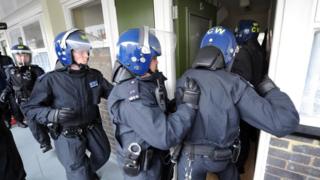
A no-deal Brexit poses a risk to the public because the UK would lose access to EU-wide security powers and databases, police leaders have warned.
Police and crime commissioners say law enforcement agencies "face a significant loss of operational capacity" if the arrangements stop.
They have asked the home secretary to confirm his contingency plans.
The Home Office says it will continue to make the case for the retention of the capabilities.
In a letter to Home Secretary Sajid Javid, the Association of Police and Crime Commissioners' cross-party Brexit Working Group stresses the importance of continued co-operation with European policing and justice bodies after March 2019.
- At-a-glance: The UK's four Brexit options
- UK 'can't keep European Arrest Warrant'
It says 32 measures are currently being used on a daily basis including the European Arrest Warrant; the Schengen Information System - a database of "real time" alerts about certain individuals - and the European Criminal Records Information System.
"The UK and EU share a common and ever evolving threat picture. We believe that a comprehensive partnership in all areas of policing and security co-operation is of mutual benefit to all," they add.
'Delays and challenges'
The commissioners say after discussions with National Crime Agency and the National Police Chiefs' Council, they understand "considerable additional resource would be required for policing to operate using non-EU tools and that such tools would be sub-optimal - potentially putting operational efficiency and public safety at risk".
They add: "We are therefore concerned that a 'no deal' scenario could cause delays and challenges for UK policing and justice agencies."
The EU's chief negotiator Michel Barnier has indicated the UK would not be able to remain part of the European Arrest Warrant after Brexit and said it would not have the same access to organisations such as police agency Europol.
But in June, the prime minister complained EU negotiators were blocking agreement on deals, risking the safety of EU and UK citizens.
A Home Office spokesman told the Guardian: "There is widespread recognition that the UK and EU can most effectively combat security threats when we work together.
"It is important we maintain operational capabilities after Brexit, and we will continue to make this case to the European Commission."
He said the government was confident co-operation would continue but it was also preparing for "every eventuality, including no deal".
Comments
Post a Comment